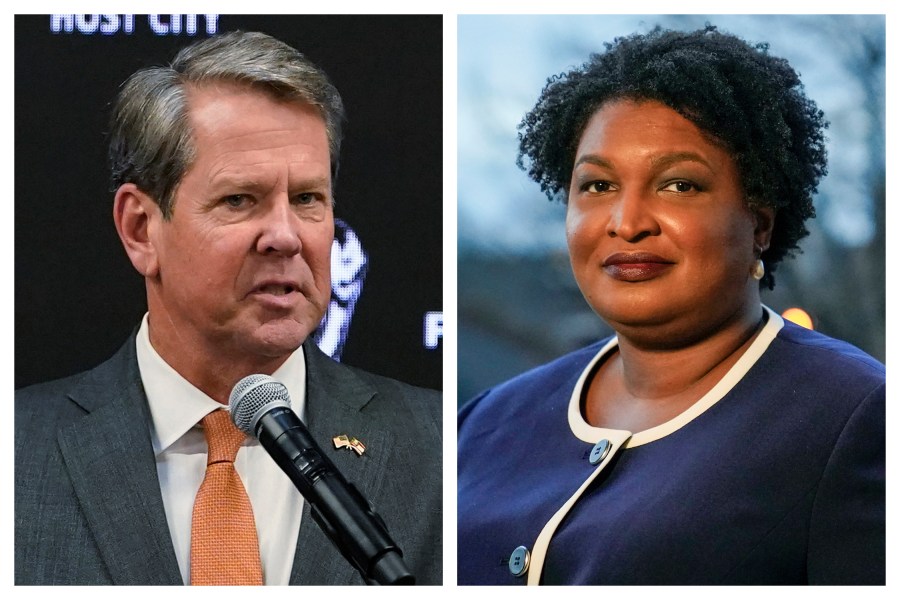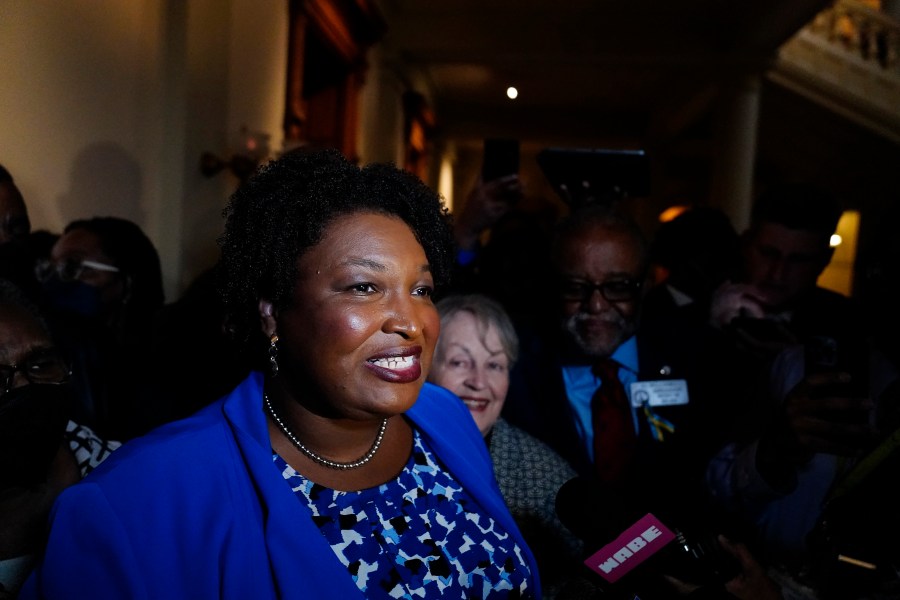Five takeaways from the Abrams-Kemp debate in Georgia
Georgia Gov. Brian Kemp (R) and his Democratic rival Stacey Abrams faced off on Monday in their first debate since they competed for the governor’s mansion in 2018.
The debate quickly became a policy-heavy affair, with the candidates hammering each other over everything from education to crime to election laws. What’s more, it unfolded on the first day of the state’s early voting period, offering Abrams and Kemp a key chance to make their cases to undecided voters before they cast their ballots.
Here are five takeaways from the Georgia gubernatorial debate.
Kemp leans on his record

Unlike in 2018, Kemp is heading into Election Day with a full term as governor under his belt. And on Monday, he sought to remind voters what that entails.
He repeatedly touted his decision to lift pandemic restrictions against the advice of public health officials, arguing that it strengthened Georgia’s economy while other states faltered. He boasted that he used the state’s budget surplus to give teachers a $5,000 raise. And he stood by a sweeping election reform law he signed last year, claiming that voter turnout has increased, despite accusations of voter suppression.
What’s more, Kemp sought to blunt Abrams’s criticism by accusing her of dodging questions about her own record. In fact, Abrams hasn’t served in public office since 2017, when she resigned her position in the state General Assembly to focus on her 2018 gubernatorial campaign.
“I would just say that Ms. Abrams is going to do a lot of attacking of my record tonight because she doesn’t want to talk about her own record,” Kemp said.
Kemp’s strategy underscores his bet that his record in the governor’s mansion is perhaps his biggest asset as he seeks a second term in office, especially given that his approval rating remains above water.
Abrams returns to her 2018 playbook

Abrams stunned many political observers in 2018 when she came within 55,000 votes of defeating Kemp in the race for Georgia governor with a campaign that focused on voting rights and the need for greater racial equity.
She has largely tried to replicate that strategy this year, attacking Kemp and Republicans for implementing new voting laws and hammering the need to balance public safety with police reform.
In one heated exchange, Abrams accused Kemp of ignoring the struggles of Black and brown people who have faced police discrimination, saying that “while you may not have had that experience, too many people I know have.”
She also touted efforts by Abrams and her allies to implement election reforms in the wake of the 2018 election to make voting more accessible.
“We didn’t win every single claim, but we forced major changes to the election laws,” she said.
All told, Abrams is hoping to recreate the momentum that helped propel her to a near-win four years ago. But she’s facing a very different political environment this year than she did in 2018, and the question is whether her message has the same resonance.
Crime becomes a flashpoint

Rising crime and public safety dominated a significant portion of the Monday night debate as both Kemp and Abrams sought to cast themselves as the ones to tackle what has become a major issue of the 2022 midterms.
In an effort to put Abrams on defense, Kemp pressed her to say how many sheriffs or law enforcement groups have endorsed her campaign for governor. Abrams, meanwhile, sought to turn the tables on Kemp, noting that crime has risen under his watch and accusing him of relying on platitudes to talk about public safety.
“Unlike you, I don’t have the luxury of relying on slogans to describe my position on public safety,” she said.
Abrams also sought to tie Kemp’s efforts to loosen gun restrictions to a rise in violence in Georgia, arguing that “we have a governor who’s weakened gun laws across our [state], flooded our streets with guns by letting dangerous people get access to the weapons.”
Kemp, meanwhile, said that Abrams was supported by organizations that back the “defund the police” movement, turning to a talking point that Republicans have repeatedly used against Democrats in recent years.
Abrams gives muddy answer to election question

After falling short in her 2018 bid for governor, Abrams declined to concede defeat to Kemp, arguing that voter suppression and Kemp’s position at the time as Georgia secretary of state raised serious questions about the election’s fairness.
That refusal four years ago has remained a line of attack for Republicans, who have accused Abrams and Democrats of hypocrisy for criticizing former President Trump’s baseless claims of voter fraud in the 2020 election.
Asked on Monday whether she would concede to Kemp this year if she loses again, Abrams was circumspect in her answer, saying she would “always acknowledge the outcome of elections” but would fight what she described as unfair voting laws.
That response is likely to open her up to further Republican attacks. Earlier this month, Abrams told ABC News in an interview that while she would “not question the outcome of the election,” she would still “question the process.”
Libertarian candidate gets spotlight

Kemp and Abrams may be the main contenders for the Georgia governor’s mansion, but the debate also featured a third candidate: Libertarian Shane Hazel.
And while Hazel may not cut the same kind of profile as his rivals, he emerged as an outsize presence on the debate stage. At various points in the night, he interrupted both Abrams and Kemp and sparred aggressively with both.
During one portion of the debate in which the candidates were given the chance to ask each other questions, Hazel pressed Kemp to “apologize” for his handling of the COVID-19 pandemic, railing against government restrictions and even raising questions about COVID-19 vaccines.
At another point, he repeatedly talked over Abrams as she sought to respond to a question about public education. Hazel used the discussion to call for the elimination of government-run education.
Of course, Hazel is almost certainly guaranteed to lose the November election. But Georgia’s election rules require a candidate to receive more than 50 percent of the vote to win an election outright, and if Hazel manages to peel off enough support from the two major party candidates, it could force Kemp and Abrams into a runoff.
Copyright 2023 Nexstar Media Inc. All rights reserved. This material may not be published, broadcast, rewritten, or redistributed. Regular the hill posts







